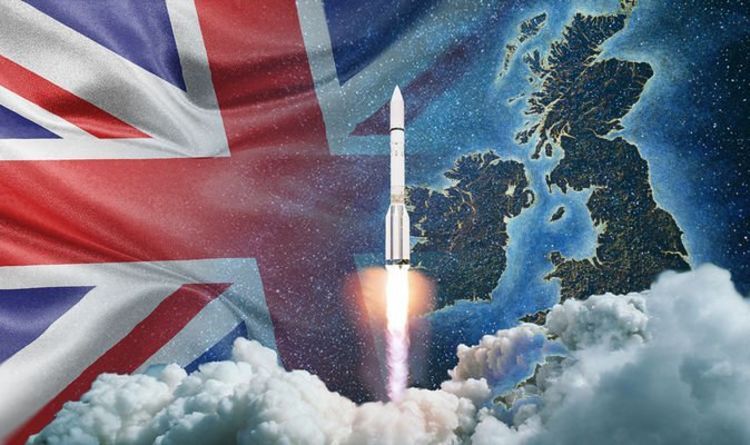New Paper Reveals How UK is Making Plans for War in Space
Article by Kit Klarenberg March 25, 2021 (rt.com)
• In 1997, the US Space Command’s ‘Vision for 2020’ forecast that space power would evolve into a “medium of warfare” during “the early portion of the 21st century”. Washington being able to “control” and “dominate” space in order to “deny other nations access”, was considered a top priority. Barack Obama escalated deployments of ‘first-strike’ missile defense systems encircling Russia and China in range to strike ground stations that communicate with orbiting military satellites. In March 2018, Donald Trump broached the creation of a ‘Space Force’, and in August 2018 the US’s 2019 National Defense Authorization Act repeatedly referenced “space warfighting operations” and plans to create a “unified command for space” under US Strategic Command.
• Now the UK wants to get in on the action. On March 22, the UK government published its ‘Defence Command Paper 2021’, outlining London’s grand vision for its “role in the world over the next decade” in respect of military and intelligence capabilities and operations. “Space, and our assured access to it, is fundamental to military operations,” the paper reads. “We must develop military, civilian and commercial capabilities that are resilient to and protected from space threats. We must also help shape an international environment of behaviours and operating norms that deters adversaries.”
• By 2030, the UK intends to have “the ability to monitor, protect and defend” its interests “in and through space”. Over the next 10 years, a total of £5 billion will be invested in Skynet, the Ministry of Defence (MoD) network of military communications satellites, which supports the Five Eyes global spying apparatus. £1.4 billion will be spent establishing a dedicated space command, launch a National Space Operations Centre, develop an “intelligence, surveillance and reconnaissance satellite constellation”, and create a “Space Academy” to train Britain’s new army of “space specialists”.
• In May 2020, then-MoD Permanent Secretary Sir Stephen Lovegrove told a parliamentary committee that space was “now recognized as a warfighting domain.” The Defence Command Paper states that UK military and intelligence capabilities will from now on be fully integrated across “space, cyberspace, maritime, land and air”. By August of 2020, Royal Air Force officers began training at the US Space Command’s Space Defense Operations Center in California.
• Defence Secretary Ben Wallace consistently frames UK space-combat capacity as inherently defensive in nature. But in April 2019, a mysterious aircraft crash-landed in the West Australian outback. It was revealed to be a state-of-the-art experimental solar-powered surveillance drone, produced by aerospace firm Airbus for the MoD. The craft has a 25m wingspan and is capable of flying unmanned at a height of over 65,000 feet – twice the altitude of a commercial airliner, at the very edge of space.
• China and Russia have repeatedly presented draft treaties to the United Nations calling for a ban on the deployment of conventional weapons in space, and a prohibition on the use of force in and from space and against spacecraft. Despite being supported by an overwhelming number of UN member states, the proposals were consistently rebuffed by Washington.
• The UK’s updated defense priorities are Britain’s own contribution to this determined push to transform space into a dangerous battleground. By Ben Wallace’s own admission, there is “limited international agreement on norms and conventions” relating to the regulation of space technology, combined with “a lack of ethical standards to encourage their responsible use”. A cynic might suggest that, in fact, Whitehall intends to exploit these regulatory and moral shortfalls to its own advantage.
 Space battles are the stuff of science fiction, but recent technological and political
Space battles are the stuff of science fiction, but recent technological and political

developments have done much to make the prospect an ever more likely reality – and it’s clear the UK wants to get in on the action.
On March 22, the UK government published its Defence Command Paper 2021, a 76-page document offering further clarity on the previous week’s Integrated Review, which outlined London’s grand vision for its “role in the world over the next decade” in respect of military and intelligence capabilities and operations.

An accompanying foreword authored by Defence Secretary Ben Wallace – former British Army soldier and director of military technology firm QinetiQ, who has previously condoned torture – spells out the paper’s disturbing dimensions in some detail.
Strikingly, it contained dozens of references to space in a military context. The heavens were said to be of growing significance as an operational and “warfighting” domain – a dedicated section describing Whitehall’s plans to secure dominance in the sphere.
“Space, and our assured access to it, is fundamental to military operations. Loss of, or disruption to, the space domain could severely impact our ability to undertake most defence tasks,” it read. “We must develop military, civilian and commercial capabilities that are resilient to and protected from space threats. We must also help shape an international environment of behaviours and operating norms that deters adversaries.”
FAIR USE NOTICE: This page contains copyrighted material the use of which has not been specifically authorized by the copyright owner. ExoNews.org distributes this material for the purpose of news reporting, educational research, comment and criticism, constituting Fair Use under 17 U.S.C § 107. Please contact the Editor at ExoNews with any copyright issue.
